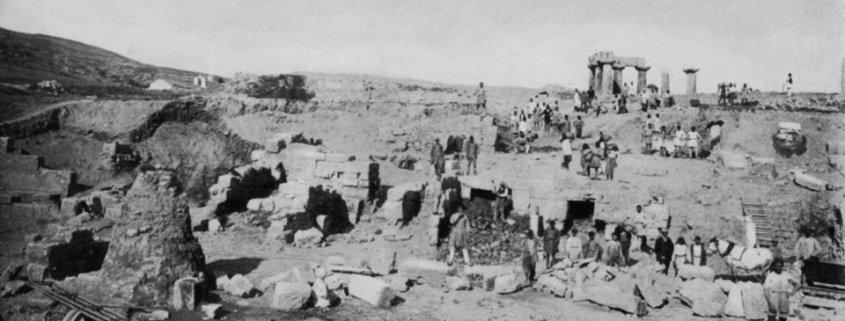22-23 February 2018 – CRASIS: Motivation and Causality
22-23 Feb. 2018
CRASIS: Motivation and Causality
Groningen
Discourses of motivation and causality are so basic to the study of the ancient world (Graeco-Roman, Mediterranean, Near Eastern) that they are hardly (if ever) addressed explicitly. Yet if we start thinking about motivation and causality in relation to the ancient world and attempt to determine what the meaning and impact of these concepts are it is difficult to formulate a clear answer. Therefore, the seventh CRASIS Annual Meeting/Master Class aims to explore these fundamental concepts both within the ancient world itself as well as in contemporary approaches to the ancient world. The study of motivation and causality in the ancient world is pursued in many forms, from the study of individuals and their motivations to large-scale social, economic, political, and institutional processes. Why did ancient individuals and groups of people do what they did? How did they motivate important decisions, and how did they explain the causality behind such decisions? What were the driving forces (e.g. military, economic, religious, philosophical) that led to the making of certain decisions both in relation to groups and individuals, and how do we isolate and study these forces? Was agency located at the individual or at the communal and institutional level? Where and when can we find important shifts in how ancient people approached decision-making in terms of expediency, egoism, practicality, profit, tradition, culture, or honor?
A fundamental question is how scholarly models of explanation relate to the explanatory models that were used in antiquity. Which shifts can we detect in the study of the ancient worlds in the past few decades? How can we explain these shifts, and how does this influence our research results? What role, if any, should categories and discourses as found in ancient literary, epigraphic, and material sources play in our analysis, over against our own questions, categories, and models? Should scholars studying the ancient world worry about anachronism?
We welcome papers exploring ‘motivation and causality’ from literary, historical, philosophical, art-historical, and archaeological perspectives. Possible topics include, but are not limited to:
Forces of motivation and causality. The role of religious and cultural values in governing behavior in Graeco-Roman, Mediterranean and Near Eastern societies as opposed to factors of expediency, egoism, practicality, and profit.
Questions about individuality and the location of agency. Individual vs. corporate decision-making. To what extent could people think of themselves as individuals or groups? How and why did individuals or groups assert themselves in public discourse?
Explanation and justification of events ex post facto, e.g. through military, political or economic factors, divine providence, or fortune and fate.
Bodies of evidence (literary, epigraphic, archaeological). Methodological problems vis-à-vis the handling of bodies of evidence in relation to studying questions of motivation and causality.
Modern vs. ancient. Factors causing scholars to ask questions about antiquity. The rationale behind meta-trends in contemporary scholarship. The question of anachronism and contemporary models of explanation for studying antiquity.
————————————————
CRASIS is the interdisciplinary research institute for the study of culture, religion, and society in the ancient world at the University of Groningen. This year’s event is already its seventh Master Class and Annual Meeting. CRASIS is set up as a meeting place for students at PhD or Research Master level, post-docs, and established scholars to promote discussion and exchange of ideas beyond disciplinary boundaries.
Keynote Speaker and Master
This year’s Master and Keynote Speaker is John Ma, Professor of Classics at Columbia University. His expertise spans a broad range of topics relating to the handling of epigraphic and archaeological evidence, and the study of the legal, social and economic history of the ancient Greek world including the Near East. One of his most influential publications is his monograph Statues and Cities: Honorific Portraits and Civic Identity in the Hellenistic World (2013; rev. ed. 2015).
Submission of abstracts
PhD and Research Master Students are invited to submit a title and abstract (500 words) for the Master Class (February 22nd 2018), which explains how their own research relates to the theme.
We invite post-docs and established scholars to submit a title and short abstract (250 words) for a lecture of 35 minutes on the conference day (February 23rd 2018).
Please accompany your application for either part of the event with a brief (~75 words) academic background and deliver both parts in a single Word document to facilitate processing.
Proposals should be submitted no later than 15 November 2017 to Eelco Glas, via crasis.aws@rug.nl.
Please note that at this point, CRASIS, unfortunately, is unable to offer compensation for travel and accommodation costs of the presenters.
Further information for PhD/ReMa students
Research Master Students are expected to submit a paper of 3000-4000 words and PhD students a paper of 5000-6000 words. These papers will circulate among the participants of the Master Class and are to be submitted before 1 February 2018. During the Master Class participants will briefly present their paper, followed by a response and discussion under the expert guidance of Professor John Ma. Student participation will be graded, and is eligible for the award of 2 ECTS from your institution or research school.
For more information, send an email to crasis.aws@rug.nl or visit www.rug.nl/crasis


